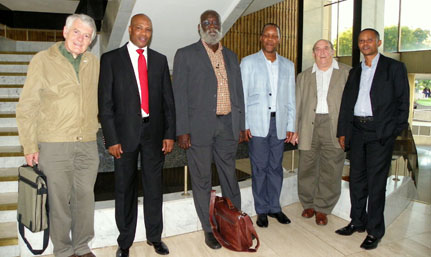|

|
|
Attending the closing seminar were from left: Prof Chris Saunders, Editor of the ANC Centenary dialogue book; Vincent Khetha from the Free State Provincial Government’s Department of Sport, Arts, Culture and Recreation; Prof Kwesi Prah; Siphamandla Zondi, Editor of the ANC Centenary dialogue book; Dr Dennis Goldberg and Prof Kwandiwe Kondlo.
Photo: Steffi Cawood
20 February 2013 |
Speech:"The future of South Africa in Africa" (pdf)
The Centre for Africa Studies received praise for the series of dialogues it hosted on the ruling ANC party, conversations which started before the party held its 53rd National Conference on our Bloemfontein Campus.
The Centre recently hosted the last seminar in the ANC Centenary Dialogue series, a project which started in November 2010 when the ruling party prepared for its centenary celebrations in 2012.
Prof Kwandiwe Kondlo, former Head of the Centre, and currently professor at the University of Johannesburg, told guests at the closing seminar, "it was a job well done which kept dialogue going on". Prof Kondlo said a book with a collection of papers presented during the series is being finalised, with senior ANC officials expected to attend the book launch on the Bloemfontein Campus later this year. The book features chapters by scholars like Profs Stephen Ellis, Shireen Hassim, Colin Bundy and Ben Turok and covers topics on the role of women in the liberation struggle, the party's economic policy and the history of the party in exile.
Speakers at the closing seminar included Prof Kwesi Prah, whom Prof Kondlo introduced as "one of Afica's intellectual giants,” struggle veteran, Dr Dennis Goldberg and the new Head of the Centre for Africa Studies, Prof Heidi Hudson.
Prof Prah, who delivered the keynote address, spoke about "The future of South Africa in Africa."